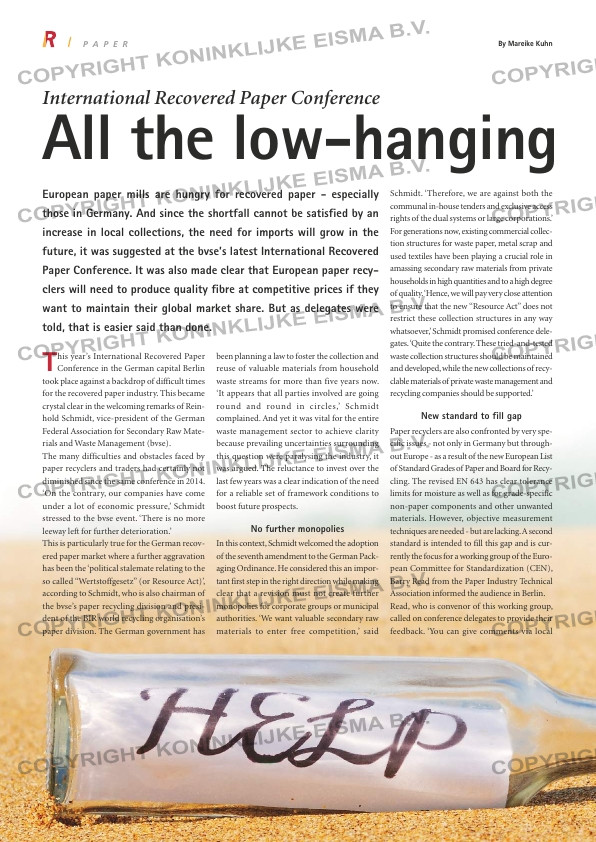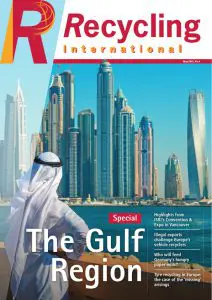Page 44 from: May 2015

This year’s International Recovered Paper Conference in the German capital Berlin
took place against a backdrop of difficult times
for the recovered paper industry. This became
crystal clear in the welcoming remarks of Rein-
hold Schmidt, vice-president of the German
Federal Association for Secondary Raw Mate-
rials and Waste Management (bvse).
The many difficulties and obstacles faced by
paper recyclers and traders had certainly not
diminished since the same conference in 2014.
‘On the contrary, our companies have come
under a lot of economic pressure,’ Schmidt
stressed to the bvse event. ‘There is no more
leeway left for further deterioration.’
This is particularly true for the German recov-
ered paper market where a further aggravation
has been the ‘political stalemate relating to the
so called “Wertstoffgesetz” (or Resource Act)’,
according to Schmidt, who is also chairman of
the bvse’s paper recycling division and presi-
dent of the BIR world recycling organisation’s
paper division. The German government has
been planning a law to foster the collection and
reuse of valuable materials from household
waste streams for more than five years now.
‘It appears that all parties involved are going
round and round in circles,’ Schmidt
complained. And yet it was vital for the entire
waste management sector to achieve clarity
because prevailing uncertainties surrounding
this question were paralysing the industry, it
was argued. The reluctance to invest over the
last few years was a clear indication of the need
for a reliable set of framework conditions to
boost future prospects.
No further monopolies
In this context, Schmidt welcomed the adoption
of the seventh amendment to the German Pack-
aging Ordinance. He considered this an impor-
tant first step in the right direction while making
clear that a revision must not create further
monopolies for corporate groups or municipal
authorities. ‘We want valuable secondary raw
materials to enter free competition,’ said
Schmidt. ‘Therefore, we are against both the
communal in-house tenders and exclusive access
rights of the dual systems or large corporations.’
For generations now, existing commercial collec-
tion structures for waste paper, metal scrap and
used textiles have been playing a crucial role in
amassing secondary raw materials from private
households in high quantities and to a high degree
of quality. ‘Hence, we will pay very close attention
to ensure that the new “Resource Act” does not
restrict these collection structures in any way
whatsoever,’ Schmidt promised conference dele-
gates. ‘Quite the contrary. These tried-and-tested
waste collection structures should be maintained
and developed, while the new collections of recy-
clable materials of private waste management and
recycling companies should be supported.’
New standard to fill gap
Paper recyclers are also confronted by very spe-
cific issues – not only in Germany but through-
out Europe – as a result of the new European List
of Standard Grades of Paper and Board for Recy-
cling. The revised EN 643 has clear tolerance
limits for moisture as well as for grade-specific
non-paper components and other unwanted
materials. However, objective measurement
techniques are needed – but are lacking. A second
standard is intended to fill this gap and is cur-
rently the focus for a working group of the Euro-
pean Committee for Standardization (CEN),
Barry Read from the Paper Industry Technical
Association informed the audience in Berlin.
Read, who is convenor of this working group,
called on conference delegates to provide their
feedback. ‘You can give comments via local
P A P E R By Mareike Kuhn
All the low-hanging fruit has been picked
European paper mills are hungry for recovered paper – especially
those in Germany. And since the shortfall cannot be satisfied by an
increase in local collections, the need for imports will grow in the
future, it was suggested at the bvse’s latest International Recovered
Paper Conference. It was also made clear that European paper recy-
clers will need to produce quality fibre at competitive prices if they
want to maintain their global market share. But as delegates were
told, that is easier said than done.
International Recovered Paper Conference
RI 4-bvse paper.indd 44 30-04-15 14:52



